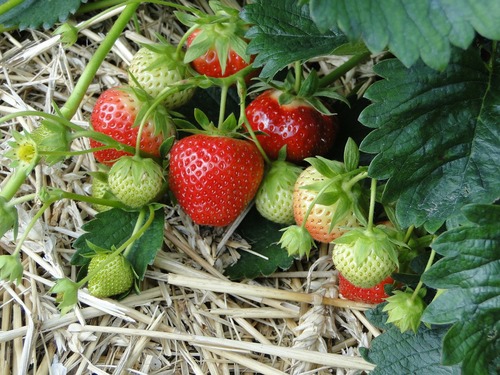Are Strawberries Bad For You?
Also Known As: fragaria
Short answer
Strawberries have been ranked the 27th best food in the United States. Strawberries not only an excellent source of vitamins, antioxidants and sugar, but they even help with allergies and constipation. One thing to be aware of is strawberries tend to have high levels of pesticide residue-- meaning they should thoroughly be rinsed before consumption.
Very healthy and numerous health benefits. A few harmful qualities may be associated, but only under certain circumstances such as an allergic reaction.
View Full Grading System
Category 'A'
Very healthy and numerous health benefits. Side effects are rare. Things rated an 'A+' are typically necessary for survival (for example, water).
Very healthy and numerous health benefits. A few harmful qualities may be associated, but only under certain circumstances such as an allergic reaction.
Very healthy and numerous health benefits. Harmful qualities may be associated, but aren't usually serious.
It is important to note that even the best things in life can become bad in immoderate amounts. So, although something may be rated an 'A+', overconsumption/overdoing can bring unwanted effects.
Category 'B'
Very beneficial to your health. Things rated a 'B+' may have a few harmful qualities to pay attention to.
Overall beneficial to your health. Things rated a 'B' may have some harmful qualities to pay attention to.
More beneficial to your health than not. However, harmful qualities are most likely associated and shouldn't be overlooked.
The main difference between category 'A' and category 'B' is the harmful qualities typically present in 'B' items. Serious side effects are usually uncommon, but are still possible and should be taken note of.
Category 'C'
Both beneficial and harmful qualities associated. Things rated a 'C+' are typically a bit more on the beneficial side. Still, moderation is important.
A fairly even ratio of beneficial and harmful qualities. Moderation is important. Very general topics that can lean towards both sides of the spectrum will be placed here as well. Rice, for example, can be good or bad depending on the type.
More harmful than beneficial. Side effects are common, especially when consumed/done excessively. Moderation is very important.
Category 'C' usually denotes to both good and bad qualities. When it comes to this category, it is important to keep this word in mind: moderation.
Category 'D'
Harmful to your health. Although benefits may be associated, the bad most likely outweighs the good. Moderation is very important.
Harmful to your health. A few benefits may be associated, but the bad outweighs the good. Moderation is extremely important.
Harmful to your health. Very few, if any, benefits are present. Things in this category should be avoided as much as possible.
Category 'D' is typically for things that are more harmful than beneficial. While consuming/doing something unhealthy once in a blue moon shouldn't hurt, we definitely recommend eliminating 'D' items as a regular part of your routine/diet.
Category 'F'
Category 'F' is for things that fail to bring anything beneficial to the table, and are very harmful to your health. We recommend completely avoiding anything in this category. Long-term side effects of 'F' items are usually very serious.
Category 'N'
'N' stands for neutral. Things placed into this category are generally (a) neither good nor bad for you, or (b) lack the necessary evidence to reach any conclusions.
Long answer
Strawberries are full of nutritional value. They contain high levels of vitamin C, potassium, folic acid and fiber. Strawberries also contain vitamin A, magnesium, phosphorous, selenium, calcium, iron, and protein. As a result of that, regular consumption of strawberries has wonderful benefits to your health.
Cardiovascular Disease. Strawberries are rich in flavonoids. A class of flavonoids called anthocyanins significantly reduces the risk of heart disease in young and middle-aged women, by up to 32%. Another class called quercetin is a natural anti-inflammatory. This helps in reducing the risk of atherosclerosis. That same flavonoid may even help in cancer prevention. Strawberries are also high in polyphenol. This helps to prevent platelet build-up and reduces one’s blood pressure through anti-inflammatory effects. Studies have also shown that regularly consuming strawberries reduces the levels of an artery-damaging amino acid called homocysteine. Rich in potassium and fiber, strawberries can also support heart health. In one recent study, for example, high potassium consumption has been linked to the reduction of death due to ischemic heart disease.
Constipation. High in water and fiber content, strawberries are excellent for minimizing constipation. Water not only helps to keep you hydrated, but also helps keep your bowels moving smoothly.
Stroke. Strawberries are rich in quercetin, kaempferol, and anthocyanins. Studies have shown that these help to reduce the formation of harmful blood clots associated with stroke. A high potassium intake has been linked with a reduced risk of stroke as well.
Allergies. Quercetin found in strawberries has an anti-inflammatory effect. Consumption of strawberries helps to lessen the symptoms of allergies such as a runny nose, hives or watery eyes.
Possible short-term side effects
Possible long-term side effects
- may aggravate kidney / bladder stones
Ingredients to be aware of
Benefits
- great source of countless nutrients
-
anti-inflammatory
-
reduces risk of heart disease and stroke
-
reduces risk of cancer
-
reduces risk of atherosclerosis
-
promotes bright, white teeth
-
helps prevent constipation
-
may lessen allergy symptoms
-
lowers homocysteine levels
Please turn your Ad Blocker off to see this content. Thank you!
Thank you for your feedback!
Written by Healthy Living 35
Published on: 02-19-2016
Last updated: 12-10-2016
Thank you for your feedback!
Written by Healthy Living 35
Published on: 02-19-2016
Last updated: 12-10-2016

 Approved by
Approved by 















